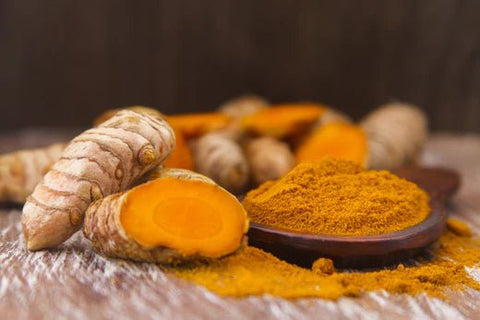Stress resilience is the magic word that will help you not get lost in the modern world. It's a skill that everyone would love to have. And did you know that adaptogens can help you to develop it? Find out everything about adaptogens in this article.
Inhaltsverzeichnis
What are adaptogens?
The word adaptogen is derived from the Latin word "adaptare." And this is what happens in your body through adaptogens - you adapt to demanding situations and become more resilient while facing stress. It results in more energy, a more robust immune system, and generally better well-being.
Adaptogens come mostly from medicinal plants, which form bioactive substances as protection against herbivores. For humans, these substances have a health-promoting effect on the body.

Israel Brekhman is considered the "father of adaptogens." Since his research, interest in bioactive plants has steadily increased to the present day. As early as 1980, the scientist formulated three criteria that an adaptogen must meet:
- An adaptogen must have non-specific activity. That means increased resistance to physical, chemical, or biological pollutants.
- An adaptogen must have a regulatory influence.
- An adaptogen must be harmless and must not interfere with normal bodily functions more than necessary.
Due to these requirements, adaptogens differ from stimulants such as coffee or nicotine because they have no potential for addiction and do not cause any side effects such as a racing heart or insomnia. On the contrary, they work based on a protective effect.
Substance groups that show an adaptogenic effect are flavonoids, polyphenols, terpenes, and polysaccharides. You may have come across some of them under the term secondary plant substances.
How do adaptogens work?
You're probably wondering how these bioactive substances are supposed to help you perform better. To understand this, the hypothalamic-pituitary-adrenal (HPA) axis comes into play. This hormonal control circuit influences many bodily functions and reactions, such as stress.
Adaptogens start acting here: they lead to an upregulation of specific enzymes, activating pathways that regulate stress resilience. These processes improve mental and physical performance, increase energy and well-being, and possibly ensure a longer life.
Stress throws some functions in the body out of balance. The result is fatigue and exhaustion. Adaptogens bring the body back into balance so that you are not exhausted even after stressful situations.
It is also assumed that adaptogens can prevent oxidative damage and thus maintain normal cell function.
In contrast to drugs, where the principle "one active substance for one symptom" applies, adaptogens act non-specifically. The bioactive plants strengthen the body in general, so they have a wide range of applications:
- with increased stress
- in case of tiredness and exhaustion
- for more energy
- in a depressed mood
- for improved cognitive ability
- in anxiety and depression
- for more well-being
- with increased physical activity
- for better performance in general

Which adaptogens are there?
Since there are many adaptogens, we list the most well-known here. Most adaptogens have long been used as medicinal plants in traditional Chinese medicine, Ayurveda, or naturopathy. In Europe and the USA, they are gradually being used as food supplements and treatments.
Ashwagandha
The adaptogen has many names: Withania somnifera, sleeping berry, winter cherry, or king of Ayurvedic herbs. It is often made into tea and is said to help against insomnia and fatigue, reduce stress and relieve anxiety.
Learn more about Ashwagandha here.
Ginseng
This medicinal plant is widespread. It can be found in Korea, northeastern China, Canada, Siberia, and other areas. However, not all types have the same effects. For example, Siberian ginseng, also known as taiga root, contains bioactive substances that can help you feel more relaxed and comfortable. It improves the ability to perform under stress. In addition, there are indications of a blood sugar-reducing effect with this adaptogen, which can be interesting for people with diabetes.
Chaga
This mushroom comes from the Siberian forests and has been used as a medicinal plant for a long time. Many people drink Chaga as a tea instead of coffee in order to feel energized and ready for the challenges of the day. It is certainly healthier for your heart and blood vessels than real coffee.
Roseroot
Also known as Rhodiola Rosea or arctic root, it is one of the most popular adaptogens. The root improves stress resilience, leads to more well-being, and generally lifts the spirits.
Reishi
The mushroom of eternal life. At least that's how Reishi is appreciated in China and Japan. Its antioxidant effects, benefits for tiredness, and positive effect on the immune system have been scientifically examined.
Conclusion: adaptogens for your health
Bioactive botanicals can make you more resilient to stress. Consequences of stress such as fatgigue, exhaustion, or a weakened immune system can thus be avoided. Current studies confirm what centuries old medicine has been teaching all along: taking in ginseng, roseroot, and ashwagandha and chaga are ideal ways to strengthen your resilience to stress.
Sources:
- https://www.ncbi.nlm.nih.gov/pmc/articles/PMC3991026/
- https://oneop.org/2022/01/20/adaptogens-a-potential-solution-for-stress/
- https://www.va.gov/WHOLEHEALTHLIBRARY/tools/adaptogens.asp




 DE-ÖKO-006
DE-ÖKO-006
